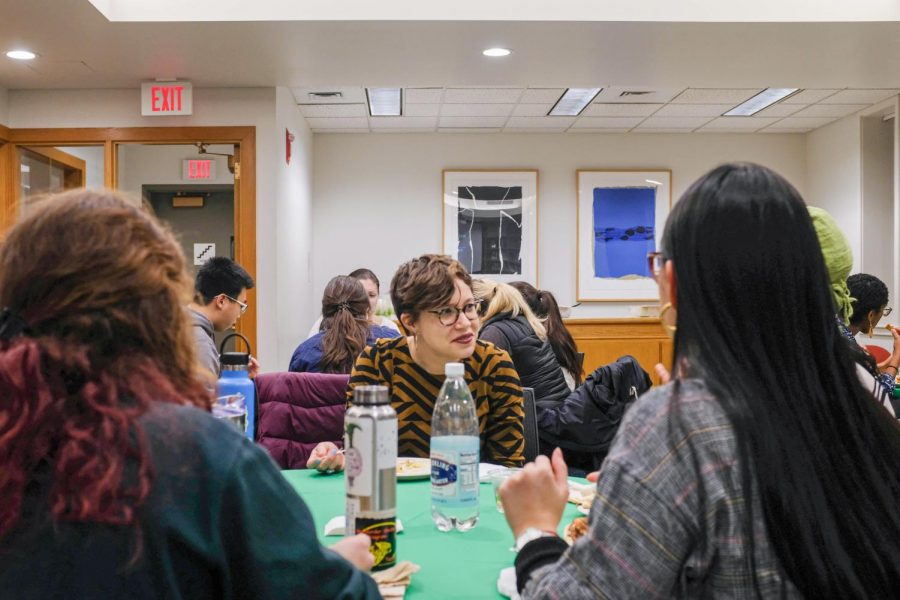Community and Global Health concentration celebrates 10 years
November 14, 2019
On Friday, Nov. 8, students, professors and alumni gathered in the Harmon Room to celebrate the 10-year anniversary of Macalester’s largest concentration, Community and Global Health (CGH). The concentration has produced approximately 300 graduates since its founding in 2009.
The event’s guest speaker, Lily Alexander ’14, is one such graduate. Her presentation, “Even Microbes Are Political: How a Liberal Arts Education Shaped my View of Public Health,” followed her post-Macalester progression from working on a farm in Wisconsin to her current job at the King County Department of Public Health in Seattle, Washington. She discussed the impact of the CGH concentration on her understanding of public health.
“Everything in public health is political,” Alexander said during her speech. “Yes, we learn the facts in class. We know, for example, that HIV/AIDS weakens the immune system. But facts like this are only the starting point.”
Alexander argued that having an interdisciplinary public health background helps researchers ask the right questions and develop critical thinking skills. Alexander wasn’t the only one interested in the program’s interdisciplinary background. For Anjali Mani ’20, taking classes from different departments helps her synthesize what she’s learned. Mani, now one of the concentration’s student ambassadors, found CGH after taking epidemiology. Epidemiology is an introductory statistics course and one of CGH’s core classes.
“Epi[demiology]’s helped me in some of my other courses,” Mani said.
As a geography major, she has integrated epidemiological concepts into her geographic research. This crossover of information is a part of what attracted Mani to the concentration. For Mani, “CGH is about drawing upon interdisciplinary fields to understand health.”
Dr. Eric Carter, professor of geography and the current CGH director echoed this sentiment.
“This program was a paradigm of interdisciplinary thinking from the very start,” he said during his opening remarks.
CGH was started as a reaction to a growing interest in public health in higher education. Carter’s predecessor in geography, Dr. Helen Hazen, built CGH with now retired professors Marty Gunderson of philosophy and Danny Kaplan of math. Alongside them were Dr. Jaine Strauss in psychology and Dr. Devavani Chatterjea in Biology, who teach popular CGH courses such as health psychology and immunology, respectively.
Similar to other interdepartmental concentrations, CGH requires an external research project.
“Community engagement is integral to the [CGH] concentration,” Carter said. “All concentrators complete an internship or advanced research project in affiliation with an organization that works in public health.”
Given the wide net of majors in CGH, topics for these final projects vary from women’s reproductive rights in Amsterdam to public health and product liability laws. These capstones are developed during internships, study abroad experiences and individual research projects. Concentrators can investigate public health through the lens of their major or combine academia with their personal interests.
The combination of interests is what drew Alexander to the program.
“CGH brought together a lot of my dispersed interests and was the thing that tied them all together. It gave me a tangible vision for what I could do in the future,” Alexander said.
After graduating from Macalester, Alexander started a fellowship with the Institute for Health Metrics and Evaluation. Then, she was able to complete her Master’s in Public Health at the University of Washington.
Alexander’s research focused on sexual health, particularly accessibility to emergecy contraceptives. This work combined her background in geography with her experiences in CGH, culminating in Miss Morning After, a project that aimed to make pharmacies more welcoming for teens in search of emergency contraceptives.
Alexander credits CGH with her love for advocacy.
“CGH, at least for me, planted the seeds of interest to pursue a career in public health in the first place,” she said. Her return to campus made her excited for the future of the concentration.
Carter too looks forward to the future of CGH. He’s interested in integrating more departments into the program, particularly the humanities. The concentration has a large quantity of students from the social and natural sciences, but appears to have room for improvement when it comes to humanities students. Carter aims to increase the concentration’s reach into such departments, as well as work on developing international partnerships and increasing alumni-student networks.
As long as students and alumni like Alexander are excited about public health, the concentration shows no sign of stopping.
“CGH was more integral to my [college] experience than my major or minor,” Alexander said during her talk. “I hope there are many more decades of churning out public health enthusiasts!”













